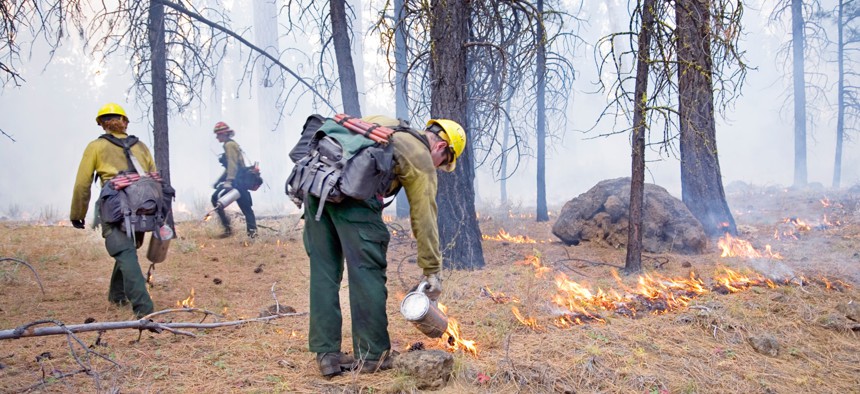
A minibus spending bill the House will vote on this week includes $4 billion for federal firefighting spending, plus other potential funding, Buddy Mays / Getty Images
Congress' minibus spending deal could potentially avert firefighter pay cliff
Lawmakers have until Friday evening to pass the first of two spending packages that will run until Sept. 30.
If Congress votes, as expected, this week to avert a partial government shutdown by passing the first of two long-awaited minibus appropriations packages, it will put an end to the ever-looming “pay cliff” facing federal firefighters, at least until September.
Following a series of short-term continuing resolutions, congressional appropriators this week unveiled a compromise spending bill funding the departments of Agriculture, Energy, Housing and Urban Development, Transportation, Veterans Affairs, Interior, Commerce and Justice, as well as the Environmental Protection Agency and other independent agencies, with the aim of passing it before funding runs out Friday night.
For federal agencies involved in wildfire mitigation, the measure marks a reprieve from anxiety over a potential mass exodus from the nation’s corps of federal wildland firefighters until the end of the current fiscal year this September. That’s because a pay raise to the tune of 50% of federal firefighters’ base pay or $20,000, whichever is less, was authorized as part of the bipartisan infrastructure law, but the money to pay for those raises was set to dry up last fall, though lawmakers have included temporary extensions of the program in short-term funding bills since then.
Federal wildland firefighters and organizations that represent them have warned since last year that if the temporary raises, which brought federal firefighters’ wages above President Biden’s $15 minimum wage for federal workers and contractors, lapse, between one-third and one-half of federal wildland firefighters will seek employment elsewhere. Union leaders said some of their members have already been headhunted by non-federal fire suppression organizations, such as California’s state fire agency, Cal Fire.
The first minibus spending bill includes $4 billion for federal firefighting spending, which would mark a 20% cut, except that the measure sets aside more than $2 billion if needed, alongside some carryover funds the agencies may still access. Though the threat of another so-called “pay cliff’ remains on the horizon, lawmakers said they hope to make the pay raises permanent, such as through the Tim Hart Wildland Firefighter Classification and Pay Parity Act, between now and September.
“This bipartisan package will keep America moving forward—strengthening investments to ensure safe and efficient travel and sustaining critical programs as Democrats build America’s infrastructure,” said Senate Appropriations Committee Chairwoman Patty Murray, D-Wash. in a statement. “We keep our promises to brave wildland firefighters and protect vital investments to stay the course on historic climate action taken by the Biden administration while safeguarding our public lands.”
The National Federation of Federal Employees, which represents around 10,000 federal wildland firefighters, applauded the news, saying the measure should sustain current firefighting staffing levels at federal land management agencies.
“This is a significant development for NFFE members and all federal wildland firefighters,” said NFFE National President Randy Erwin on Monday. “For months, these selfless men and women have had to live with the possibility of their pay being cut in half overnight. Many NFFE have traveled to Washington, D.C., contacted their representatives and done everything they can to advocate for the compensation they deserve by protecting the country on the front lines of the wildfire crisis. Today, their efforts have been recognized and Congress has delivered on their obligations for this year’s fire season.”
Congress has until Friday evening to send the measure to Biden’s desk for enactment.
NEXT STORY: DOJ issues 'gag order' on immigration judges







